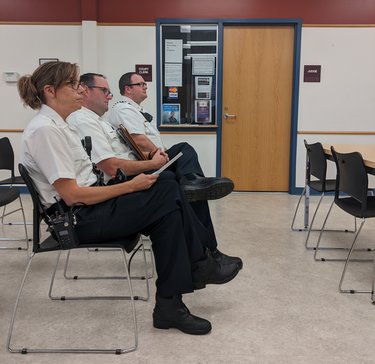Knox approves hardship fee waiver for EMS services
The Enterprise — Melissa Hale-Spencer
Leaders of Guilderland Emergency Medical Services — from left, Alexander Downey, senior paramedic supervisor; Sean McGaughnea, director; and Bonnie-Jean Johnson, acting director of EMS operations — address the Knox Town Board on Aug. 19 about a hardship fee waiver to which the board agreed.
KNOX — All four Knox Town Board members present at their Aug. 19 meeting voted in favor of a fee waiver policy for hardship proposed by Guilderland Emergency Medical Services.
For decades, Knox, which never had its own ambulance service, paid two squads made up of volunteers — one based in Altamont and the other in Berne — to cover the town.
Helderberg Ambulance still provides basic life support service for half the town but the Altamont squad closed at the end of 2023.
Starting Jan. 1, 2024, GEMS took over basic life support for the portion of Knox that had been covered by the Altamont Rescue Squad while continuing to supply advanced life support to the entire town of Knox.
Basic Life Support, known as BLS, provides foundational, non-invasive care for a broad range of emergencies, usually provided by an Emergency Medical Technician, or EMT.
Advanced Life Support, or ALS, offers specialized and invasive procedures for critically ill or injured patients requiring a higher level of medical intervention, generally provided by a paramedic and often with a specially equipped ambulance that has cardiac monitors, ventilators, intravenous fluids, and more.
Knox Supervisor Russ Pokorny said he had googled the federal poverty level but, as he started reciting figures — an annual income of $12,760 for a family of one — he was interrupted by Sean McGaughnea, GEMS director.
“We felt the federal one was incredibly too low,” McGaughnea said. “We changed that this year.”
GEMS now uses New York state’s WIC (Women, Infants, and Children) figures on poverty.
According to the state’s health department, effective through June 30, 2026, the WIC income cutoff for a family of one is $28,953 annually or $557 weekly. This increases by $10,175 for each family member so that, for example, the cutoff for a family of eight would be $100,178.
Knox residents who have used GEMS services will need to fill out a one-page form to qualify for the hardship fee waiver. The form is currently posted on the town of Guilderland website, and Knox Clerk Traci Delaney it may soon be posted to the Knox website as well.
“We’re going to refresh the website,” she said.
“They need to fill out the form every time,” said McGaughena, noting that, in Guilderland, it is mostly used by elderly patients but also by college students and by people who are unemployed.
“People’s incomes change,” he said, explaining why it has to be submitted on a “case by case” basis.
“We’ll process it and keep track of it all,” McGaughena said, adding, “We’re not looking for their last dollar.”
GEMS transport fees go from $1,250 for basic life support to $1,750 for advanced life support to $2,500 for a higher level of advanced life support.
With no transport, fees are $250 for basic life support and $500 for advanced life support with higher fees for other services like $1,200 for “secured cardiac arrest.”
GEMS provides this explanation for the fee scale: “While taxes still provide a portion of operational funding, ambulance fees collected from insurance companies mitigate the taxpayer burden. Without billing for ambulance services, other Town funds would need to be redirected to support EMS.”
The policy also says that more than 30 percent of patients using EMS in Guilderland live outside the town and goes on, “If taxes were used as the only source of funding, non-Guilderland residents would essentially use the system for ‘free,’ while Guilderland residents paid the bill. EMS billing reduces the tax subsidy of EMS for Guilderland residents.”
The GEMS policy on the reason for the hardship fee waiver says, “Although most patients have health insurance in some form, there are some who do not, and many others who are underinsured.
“EMS billing is a complex process that involves copayments, assessment fees, advanced life support response, basic life support transport, etc. Many times insurance companies only pay a portion of these bills, leaving an outstanding balance to the patient’s responsibility. This can present a hardship for those who live on a fixed income, have financial emergencies, setbacks, or major life changes that make it difficult for them to meet their monthly obligations.”
“We want to make sure people still use ambulance service,” McGaughnea told The Enterprise.
“We want them to take care of their health rather than worry about the bill,” added Bonnie-Jean Johnson, acting director of GEMS operations.
As the GEMS leaders left the Knox meeting, Pokorny said, “We really appreciate your service — remarkable in my opinion.”



